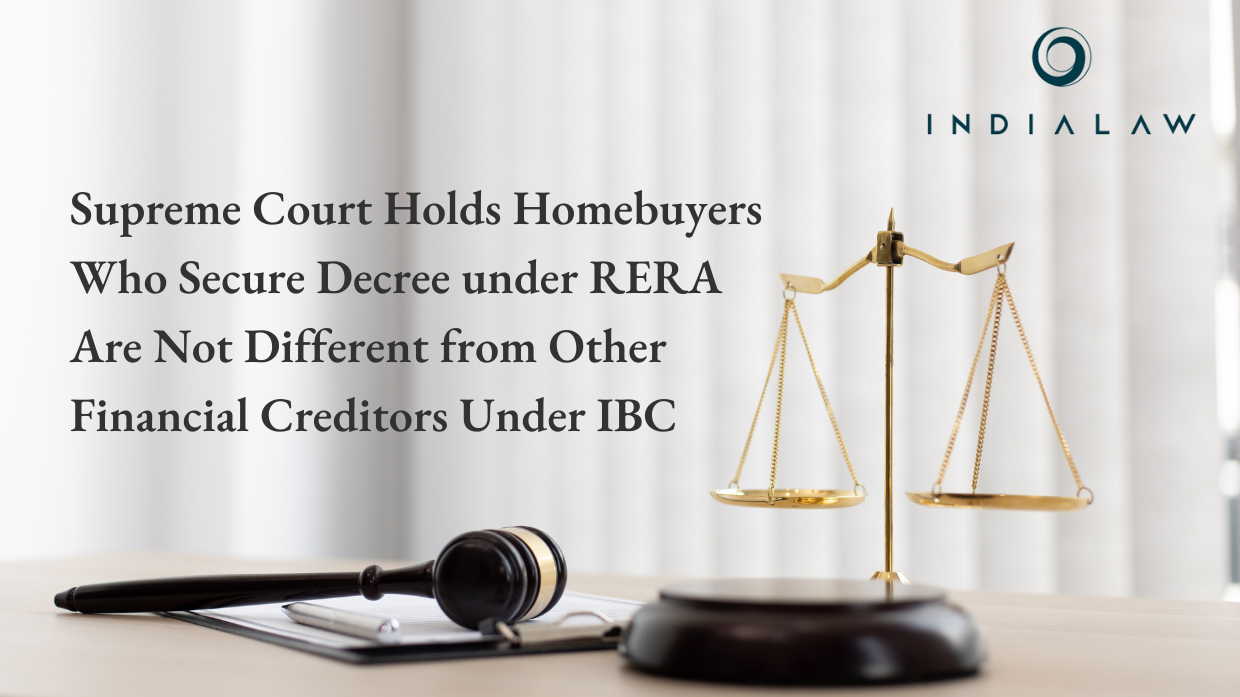Supreme Court Holds Homebuyers Who Secure Decree under RERA Are Not Different from Other Financial Creditors Under IBC

In a notable judgment[1], the Hon’ble Supreme Court (“SC”) held that homebuyers cannot be treated differently from other ‘financial creditors’ under the Insolvency and Bankruptcy Code, 2016 (IBC) merely on the ground of securing favorable orders from the authority under the Real Estate (Regulation and Development) Act 2016 (RERA).
The SC bench comprising of Justice S Ravindra Bhat and Justice Aravind Kumar has set aside an order of the National Company Law Appellate Tribunal (NCLAT) which held that the beneficiary of orders of the RERA Authority should be treated differently from other home buyer allottees.
The brief background of the case is that the Appellants (Vishal Chelani & Ors.) booked flats during 2011-2012 in a project named Bulland Elevates developed by Bulland Buildtech Pvt Ltd. There was a delay in completion of the project and hence the Appellants filed a complaint before the Uttar Pradesh Real Estate Regulatory Authority (“UPRERA”). The complaint was admitted, and the recovery certificate was issued for refund of the amount to the appellant for the purchase of a flat.
Subsequently, the IBC proceedings were initiated, in the resolution plan presented before the Adjudicating Authority, a distinction was made between home buyers, who had opted for remedy before the authority under RERA and securing orders in their favour, and those who did not.
Home buyers who did not approach authorities under RERA were given the benefit of 50% better terms than that given to those who approached RERA or who were decree holders.
An appeal was filed before the SC after the Adjudicating Authority rejected their applications and subsequent appeal before the NCLAT was rejected too.
The issue before the SC was whether the homebuyers, who secured a favorable decree through authority under RERA for a refund of their investment, need to be treated as financial creditors under the IBC?
The RP contended while resisting the appeal filed before the SC that the appellants could not secure two benefits. It contended that having approached the UPRERA, they fell into a different sub-class of home buyers, who were entitled to specified amounts and, therefore, were unsecured creditors, as compared with allottees who had not invoked RERA remedies. Such home buyers relinquished their rights under Section 18 of the RERA Act.
On behalf of Appellants, it was contended that Section 5(8)(f) of the IBC was amended in 2018, after which home buyer allottees in real estate projects also fell within the broad description of financial creditors.
The SC carefully considered Section 18 of RERA, which provides for the rights of allottees. The Court categorically rejected the RP’s contentions and clarified that seeking a remedy under RERA does not alter the class of homebuyers into a separate subclass, and it would not convert them into unsecured creditors.
The Court stated that “It is only home buyers that can approach and seek remedies under RERA – no others. In such circumstances, to treat a particular segment of that class differently for the purposes of another enactment, on the ground that one or some of them had elected to take back the deposits together with such interest as ordered by the competent authority, would be highly inequitable”.
The SC agreed with the decision of the National Company Law Tribunal (NCLT), Mumbai Bench in Mr. Natwar Agrawal (HUF) through Karta Mr. Natwar Agrawal. v. Ms. Ssakash Developers & Builders Pvt. Ltd., CP (IB) No.21/MB-IV/2023, where the NCLT held that an allottee in Real Estate Project, who subsequently becomes a Decree Holder under the RERA Act, continue to be a creditor in the class of Home Buyers and shall be governed by the threshold limit prescribed under second proviso to Section 7(1) of the IBC.
While highlighting the decision of the NCLT, the SC clarified that “As held in Natwar Agarwal (HUF) (Supra) by the Mumbai Bench of National Company Law Tribunal the underlying claim of an aggrieved party is crystallized in the form of a Court order or decree. That does not alter or disturb the status of the party concerned – in the present case of allottees as financial creditors”.
Referring to Section 238 of the IBC the SC stated that the said provision contains a non-obstante clause[i] that gives an overriding effect to its provisions. Hence, the provision of the IBC attains primacy and cannot be read as subordinate to the RERA Act. Based on the said observation the Court allowed the civil appeal and directed that the Appellants should be treated in parity with other homebuyers.
The SC concluded that the appellants are the financial creditors within the meaning of Section 5(8)(f) of the IBC. They are entitled to be treated similarly with other home buyers/financial creditors for the purposes of the resolution plan which is awaiting final decision before the Adjudicating Authority.
Key findings and Conclusion
- It would be unjust to discriminate against the homebuyers who have invoked remedies under RERA with those who have not.
- Section 5(8)(f) of the IBC, does not create any sub-classification per se among financial creditors when it comes to resolution plans under the Code.
- The Court highlighted that Section 238 of the IBC contains a non-obstante clause, giving IBC an overriding effect over other Acts.
The SC judgment cleared the ambiguity for regulatory bodies, harmonizing the application and interpretation of IBC and RERA, allowing way to a more equitable legal approach in India.
[1] Vishal Chelani and others v. Debashis Nanda, 2023 LiveLaw (SC) 894
[i] A statutory provision intended to give an overriding effect over other provisions or enactments
By entering the email address you agree to our Privacy Policy.



